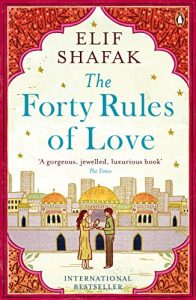The Forty Rules of Love by Elif Shafak
 ‘The Forty Rules of Love by Elif Shafak is an absolute hidden gem. I had heard about this book before but did not ever think about reading it. Until one day, when I was feeling sorry for myself, I was browsing the shelves of the Library. And there it was, with its beautiful eye-catching cover. Without a second’s hesitation, I picked it up and booked it out. Considering I am the type of person to deliberate over a book for weeks before deciding to read it, this was a surprisingly easy decision. And one that would impact my life in the most positive of ways.
‘The Forty Rules of Love by Elif Shafak is an absolute hidden gem. I had heard about this book before but did not ever think about reading it. Until one day, when I was feeling sorry for myself, I was browsing the shelves of the Library. And there it was, with its beautiful eye-catching cover. Without a second’s hesitation, I picked it up and booked it out. Considering I am the type of person to deliberate over a book for weeks before deciding to read it, this was a surprisingly easy decision. And one that would impact my life in the most positive of ways.
Shafak has created an absolute masterpiece in my opinion. The novel consists of two parallel narratives, intertwined together. The contemporary one is about an unhappily married Jewish housewife named Ella living in Northampton, Massachusetts. Ella works for a literary agency and she is given a book to work through, named “Sweet Blasphemy” by Aziz Zahara. This opens the basis for our second narrative. ‘Sweet Blasphemy’ is about a wandering dervish called Shams of Tabriz, who was a mystic Sufi in the thirteenth century. It details his journey as he meets and befriends the famous Islamic scholar and poet, Rumi, and becomes his teacher. I personally found this narrative the most intriguing as Shafak cleverly tells the story through various perspectives. From Shams to Rumi to a prostitute to a beggar to a student to a hitman and to the family of Rumi, the variety of perspectives really shows the picture of what was happening then, the love of Rumi for Shams and the hatred of the townspeople and Rumi’s family towards Shams. Whereas Ella’s narrative is purely from the perspective of Ella and therefore leaves her story very biased and difficult to connect with. Her narrative is driven by her unhappiness, caused by a cheating husband and a mundane life as a mother and housewife. We follow her personal journey as she forms a relationship with the author or ‘Sweet Blasphemy’, Aziz.
It is the teachings of the novel that really stand out and make this novel into something more. As an English Westerner, I had not heard of Sufism before reading this book and did not know much about Islam in general. I finished the book with a deep respect for spiritualism, Sufism and the poet Rumi. The book contains teachings encouraging love, acceptance and deep connections through Shams’ actual 40 Rules of Love. These teachings are paired with characters who have lost their path in life and need help, demonstrating the beauty of the teachings and the power of love. Because that is what the book is essentially teaching us all. The importance of love in this world, whether the love for God, the love for the self or the love we show to others.
Shafak’s novel is one of the best books I have ever read. It is a novel I will re-read again because there was so much to learn from it and I think with more knowledge and understanding, there is still even more to learn. Whether you believe in fate or not, I personally do, and I honestly believe this book was intended for my path, exactly when I needed it. It gave me hope and made me feel closer to God at a time when I was feeling overwhelmed by life. From the moment I started reading it, I knew this book was special. And I urge you to give it a try because it truly is a beautiful read.’
